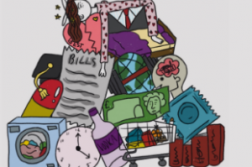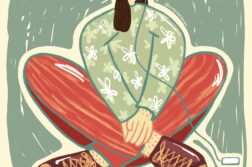When I am away at university, I might not talk to my family for the best part of the semester. That’s fifteen long weeks devoid of contact from those who raised me and they are only fifteen minutes up the road.
A short viral video clip has been doing the rounds on social media over the past few days. It features a man being interviewed by a voice behind the camera, who says, ‘Would you A: rather be quarantined for three weeks with your wife and children, or B…’, at which point the voice is cut off with the fervent shrieks of the man protesting, ‘B! B!’, without even hearing the details of his unknown fate.
Of course, we can all have a good chuckle at this man’s shock and dread at the thought of being subjected to the heavy responsibilities of 24-hour domesticity, but there is a deeper point to be extracted: why do we possess such an innate hostility to slowing down, kicking back, and spending time with those we love the most?
It has been often quoted throughout this crisis that during the First and Second World Wars, young men in their teens heard their nation’s cries during its darkest hour to defeat evil and unreservedly responded by signing up to enter the uncertain fate of the battlefield in their thousands. All we are being asked to do in 2020 is stay at home and sit on the couch, and we can’t even do that.
The last few days of my life have been filled with familial interaction, games, and meal times in front of the TV. I can’t remember the last time that happened on a regular basis; our life paths have begun to splinter. This has been evident even on Christmas Day as of late, when even those of us who do come together can’t avoid the petulant bad-temperisms created by the need to divide the roast dinner preparation workload or allocate the wrapping paper picker-upper.
However, the Coronavirus pandemic has created one great reason to rejoice that none of us could have foreseen: the revival and stunning rejuvenation of the family unit. Over the last few decades we have become so afraid of spending time with our families because of a harshly capitalist commodification of the body: we have internalised the market narrative that our worth is born out of our productivity in pounds and pence – a condition which leaves no time for such processes as family bonding or neighbourly communication.
Much of the blame for this state should of course be placed firmly upon the doorstep of technological progress that has seen handheld mobile devices become perpetual transmitters of business divulgence, creating a blurred line between the personal and the professional. But we shouldn’t shy away from our own passive role in alienating ourselves from our loved ones, from us separating ourselves from those around us to share our most intimate details with anonymous followers on the likes of Instagram and Twitter and thereby instantly rendering ourselves worthless public goods for whom genuinely familial relationships can own no space.
Today, however, we are forced to reconnect, obliged to look up from our screens, and mandated to enact a near-impossible reevaluation of our priorities in life. As many of us are forced to leave our offices, and day after day passes by without deadlines, contracts, or meetings, the familiar setting of the family home becomes our universe, and the passage of time is redrawn. Instead of existing to please our professors or employers, we can finally live for ourselves, and engage in human relationships for the sake of it.
This international disaster had destroyed tens of thousands of lives, and ruined the livelihoods of many more. The global economy will continue to reel from this shock for years to come, but there is a silver lining beyond the clouds, a legacy which will hopefully live beyond the dark days of this pandemic. Today, the role of friends and family in our lives feels more important than ever, and we have rediscovered that which makes us who we are: the love of those closest to us.



